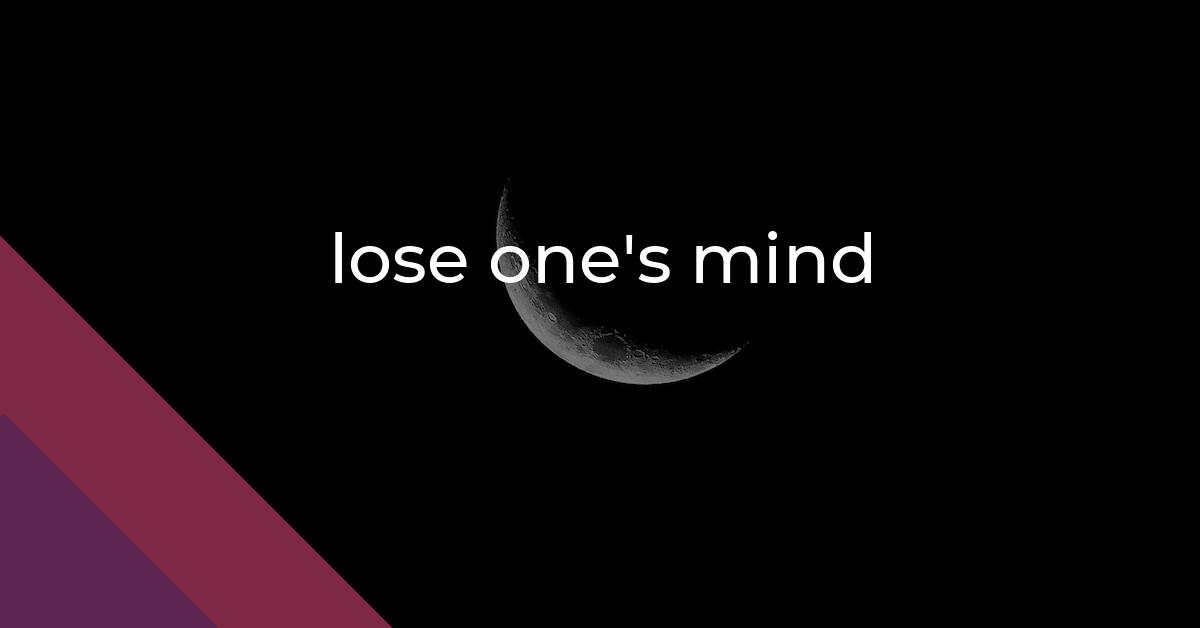lose one’s mind: Idiom Meaning and Origin
What does ‘lose one's mind’ mean?
The idiom lose one's mind means to become mentally unstable or crazy, often due to extreme stress or emotional overload.

Idiom Explorer
The idiom "round the bend" means to go crazy or become mentally unstable.
Pop one's cork: To become extremely angry or lose control of one's temper.
The idiom "out of one's mind" means to be mentally deranged or insane.
The idiom "off one's trolley" means to be crazy or mentally unstable. It is often used to describe someone who is behaving in a very strange or irrational manner.
The idiom "off one's nut" means someone is crazy or mentally unstable. It is a colloquial expression used to describe a person who is behaving erratically or irrationally.
The idiom "off one's hinges" means to be mentally unstable or irrational. It describes someone who has lost their composure or sanity, often behaving in a wild or unpredictable manner.
The idiom "off one's hinge" means to be mentally unstable or irrational. It suggests that someone is acting in a way that is unpredictable or abnormal, possibly due to stress or emotional distress. This phrase is often used to describe someone who is behaving erratically or illogically.
The Unraveling of Sanity
Idiom: lose one's mind
The idiom "lose one's mind" is a common phrase used to describe a state of mental instability or irrationality. It is typically used to express the idea of someone becoming mentally unbalanced or deranged. This phrase is often used figuratively, rather than literally.
This idiom is believed to have originated in the late 18th or early 19th century. While its exact origin is uncertain, idiomatic expressions involving the concept of "losing" or "being in possession of" one's mind have been present in various languages and cultures throughout history. This suggests that the notion of losing one's mind has a universal appeal.
The use of "losing one's mind" as an idiom reflects the common human experience of feeling overwhelmed, stressed, or bewildered to the point of mental instability. It is often used to emphasize extreme emotions or reactions to a situation, such as being shocked, astonished, or deeply disturbed.
This idiom typically implies a temporary state of insanity or the loss of rationality, rather than a permanent condition. It can be used to describe moments of intense frustration, confusion, or anger, highlighting the idea that under certain circumstances, individuals may act or think in ways that are contrary to their usual behavior.
While the idiom "lose one's mind" primarily conveys a negative connotation, there can also be instances where it is used in a more positive or humorous light. For example, it might be used in a lighthearted manner to describe someone who is intensely focused or obsessed with a particular topic, implying that they have become so engrossed with it that they have temporarily lost touch with reality.
The idiom "lose one's mind" captures a common human experience of mental instability or irrationality. It reflects the idea of being overwhelmed or consumed by extreme emotions or reactions to a situation. Despite the negative connotations, it can also be used in a more positive or humorous tone. As a widely used idiom, it is a testament to the universal appeal and relatability of the human experience.
Idiom: lose it
The related idiom "lose it" shares a similar meaning to "lose one's mind." It is used to describe a situation where someone suddenly loses control or composure due to extreme emotions or frustration. When someone "loses it," they may become angry, upset, or overwhelmed to the point of behaving irrationally or irately.
This idiom can be used to describe a wide range of situations where someone's emotions get the better of them, causing them to act out of character. For example, someone might "lose it" during an argument, resulting in shouting or aggressive behavior that they wouldn't normally exhibit. This phrase conveys a sense of losing control and succumbing to one's emotions or impulses.
The idiom "lose it" is often used colloquially and in informal conversations. It can refer to a momentary lapse in self-control or an outburst of emotion. This idiom highlights the idea that, under certain circumstances, individuals may struggle to maintain their composure and react in a more unpredictable or volatile manner.
Idiom: lose one's wits
Another related idiom, "lose one's wits," refers to a state of extreme mental confusion or disarray. When someone "loses their wits," they are unable to think clearly or logically due to fear, shock, or a stressful situation. This phrase suggests a loss of mental sharpness or cognitive ability.
The idiom "lose one's wits" can be used to describe situations where someone is overwhelmed by a challenging or unexpected event. For example, someone might "lose their wits" when faced with a sudden and dangerous situation, such as a car accident. In these circumstances, panic or shock can impair their ability to think rationally or make sound decisions.
This idiom conveys a sense of mental vulnerability or being caught off guard. It emphasizes the idea that under extreme stress or pressure, individuals may find it difficult to gather their thoughts or respond effectively to a situation. Essentially, "losing one's wits" implies a temporary loss of mental clarity or presence of mind.
The idiom "lose one's mind" captures the concept of mental instability and irrationality, reflecting the common human experience of feeling overwhelmed or consumed by extreme emotions. The related idioms "lose it" and "lose one's wits" further explore the idea of losing control or mental clarity in different contexts. These idiomatic expressions highlight the universality and relatability of the human experience, as individuals may find themselves in situations where they struggle to maintain their composure or think clearly.
Example usage
Examples of how the idiom "lose one's mind" can be used in a sentence:
- She was under so much stress that she felt like she was losing her mind.
- After hearing the news, he completely lost his mind and started shouting in anger.
- His behavior became so erratic that his friends thought he was losing his mind.
More "Mental" idioms



